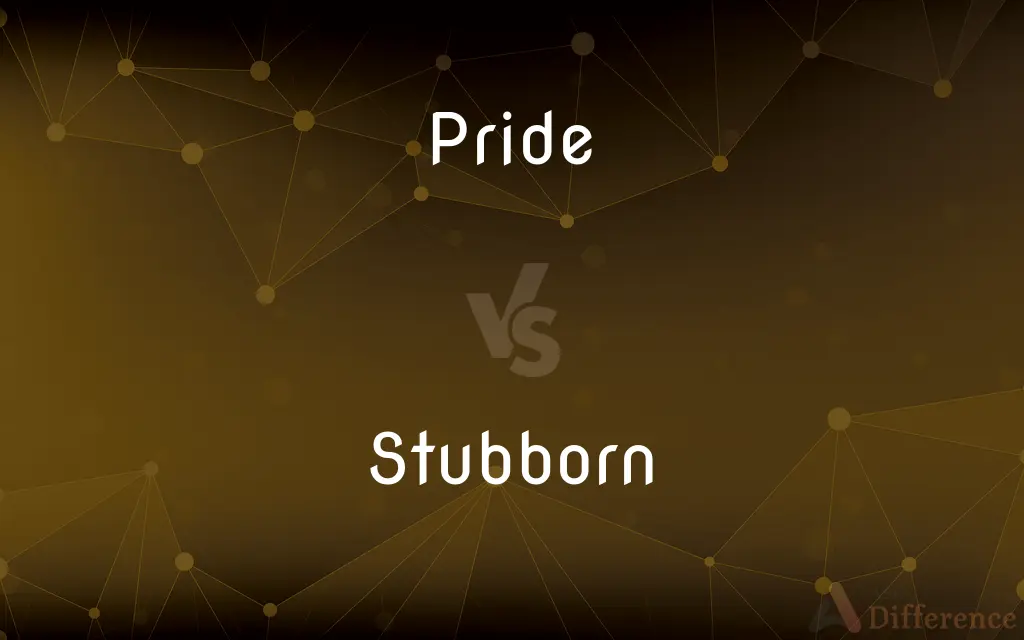Pride vs. Stubborn — What's the Difference?
Pride is satisfaction from one's achievements, while stubbornness is an inflexible adherence to one's own ideas or desires.

Difference Between Pride and Stubborn
Table of Contents
ADVERTISEMENT
Key Differences
Pride is a sense of self-esteem derived from one's own or another's achievements. It's a positive emotion that reflects a personal or collective accomplishment. Stubbornness, by contrast, is the unwillingness to change one's thoughts or actions despite reason or persuasion. It's often seen as a negative trait because it can hinder growth and understanding.
Pride relates to one's dignity and self-respect, which can contribute to a healthy self-image when in balance. Being proud of one's work or accomplishments is generally seen as positive. Stubbornness, on the other hand, indicates a resolve that can be both negative and positive—negative when it leads to intransigence in the face of necessary change, and positive when it shows as determination.
When pride is excessive, it can lead to arrogance, where one might refuse to accept help or constructive criticism, bordering on stubborn behavior. Similarly, if someone is too stubborn, they might reject valid criticism or refuse to adapt, which could be mistaken for excessive pride in one’s beliefs or methods.
Pride becomes problematic when it blinds one to their faults or leads to underestimating others. In contrast, stubbornness becomes an issue when it stops one from making beneficial changes or accepting helpful guidance. Both traits require balance and self-awareness to avoid negative outcomes.
The positive aspect of pride lies in its ability to motivate and inspire both oneself and others, while the positive aspect of stubbornness lies in its potential to help one persevere against adversity. However, both traits can create conflict when they prevent open-mindedness and flexibility.
ADVERTISEMENT
Comparison Chart
Emotion Type
Positive emotion related to self-esteem.
Negative trait related to inflexibility.
Origin
Comes from achievements or qualities.
Comes from a resistance to change or influence.
Impact on Growth
Can be motivational, leading to further achievements.
Often hinders personal growth and adaptability.
Social Perception
Seen as positive when balanced, negative when excessive.
Typically viewed negatively, but can be positive as perseverance.
Response to Feedback
When excessive, may reject constructive criticism.
Typically resists advice and insists on one's own way.
Compare with Definitions
Pride
Joy in Achievements: Pleasure from one's own successes.
His face beamed with pride as he watched his daughter graduate.
Stubborn
Unyielding in attitude or opinion.
In his stubbornness, he refused all offers of help.
Pride
Dignity: A sense of one's own worth.
She held on to her pride even in difficult times.
Stubborn
Determined to continue without giving up.
Despite the challenges, his stubborn nature kept him going.
Pride
Pride is positive emotional response or attitude to something with an intimate connection to oneself, due to its perceived value. Oxford defines it amongst other things as "the quality of having an excessively high opinion of oneself or one's own importance" This may be related to one's own abilities or achievements, positive characteristics of friends or family, or one's country.
Stubborn
Not making concessions.
He was stubborn about following the rules to the letter.
Pride
A sense of one's own proper dignity or value; self-respect.
Stubborn
Continuing a course of action without regard to discouragement.
Her stubborn streak made her an excellent negotiator.
Pride
Pleasure or satisfaction taken in an achievement, possession, or association
Parental pride.
Stubborn
Having or showing dogged determination not to change one's attitude or position on something, especially in spite of good arguments or reasons to do so
Two stubborn young people intent on doing their own thing
A stubborn refusal to learn from experience
Pride
Arrogant or disdainful conduct or treatment; haughtiness.
Stubborn
Refusing to change one's mind or course of action despite pressure to do so; unyielding or resolute.
Pride
A cause or source of pleasure or satisfaction; the best of a group or class
These soldiers were their country's pride.
Stubborn
Characterized by a refusal to change one's mind or course of action; dogged or persistent
Stubborn prejudice.
Stubborn earnestness.
Pride
The most successful or thriving condition; prime
The pride of youth.
Stubborn
Difficult to treat or deal with; resistant to treatment or effort
Stubborn soil.
Stubborn stains.
Pride
An excessively high opinion of oneself; conceit.
Stubborn
Refusing to move or to change one's opinion; obstinate; firmly resisting; persistent in doing something.
He is pretty stubborn about his political beliefs, so why bother arguing?
Blood can make a very stubborn stain on fabrics if not washed properly.
Pride
Mettle or spirit in horses.
Stubborn
Of materials: physically stiff and inflexible; not easily melted or worked.
Pride
(Zoology) A group of lions, usually consisting of several related females and their offspring and a small number of unrelated adult males.
Stubborn
(informal) Stubbornness.
Pride
A flamboyant or impressive group
A pride of acrobats.
Stubborn
A disease of citrus trees characterized by stunted growth and misshapen fruit, caused by Spiroplasma citri.
Pride
To indulge (oneself) in a feeling of pleasure or satisfaction
I pride myself on this beautiful garden.
Stubborn
Firm as a stub or stump; stiff; unbending; unyielding; persistent; hence, unreasonably obstinate in will or opinion; not yielding to reason or persuasion; refractory; harsh; - said of persons and things; as, stubborn wills; stubborn ore; a stubborn oak; as stubborn as a mule.
And I was young and full of ragerie [wantonness]Stubborn and strong, and jolly as a pie.
These heretics be so stiff and stubborn.
Your stubborn usage of the pope.
Pride
The quality or state of being proud; an unreasonable overestimation of one's own superiority in terms of talents, looks, wealth, importance etc., which manifests itself in lofty airs, distance, reserve and often contempt of others.
Stubborn
Tenaciously unwilling or marked by tenacious unwillingness to yield
Pride
A sense of one's own worth, and scorn for what is beneath or unworthy of oneself; lofty self-respect; noble self-esteem; elevation of character; dignified bearing; rejection of shame
He took pride in his work.
He had pride of ownership in his department.
Stubborn
Not responding to treatment;
A stubborn infection
A refractory case of acne
Pride
Proud or disdainful behavior or treatment; insolence or arrogance of demeanor; haughty bearing and conduct; insolent exultation.
Stubborn
Difficult to treat or deal with;
Stubborn rust stains
A stubborn case of acne
Pride
That of which one is proud; that which excites boasting or self-congratulation; the occasion or ground of self-esteem, or of arrogant and presumptuous confidence, as beauty, ornament, noble character, children, etc.
Stubborn
Persisting in a reactionary stand
Pride
Show; ostentation; glory.
Stubborn
Firmly adhering to one's purpose.
She remained stubborn in her pursuit of justice.
Pride
Highest pitch; elevation reached; loftiness; prime; glory.
Pride
Consciousness of power; fullness of animal spirits; mettle; wantonness.
Pride
Lust; sexual desire; especially, excitement of sexual appetite in a female animal.
Pride
A company of lions or other large felines.
A pride of lions often consists of a dominant male, his harem and their offspring, but young adult males 'leave home' to roam about as bachelors pride until able to seize/establish a family pride of their own.
Pride
(zoology) The small European lamprey species Petromyzon branchialis.
Pride
(reflexive) To take or experience pride in something; to be proud of it.
I pride myself on being a good judge of character.
Pride
A small European lamprey (Petromyzon branchialis); - called also prid, and sandpiper.
Pride
The quality or state of being proud; inordinate self-esteem; an unreasonable conceit of one's own superiority in talents, beauty, wealth, rank, etc., which manifests itself in lofty airs, distance, reserve, and often in contempt of others.
Those that walk in pride he is able to abase.
Pride that dines on vanity sups on contempt.
Pride
A sense of one's own worth, and abhorrence of what is beneath or unworthy of one; lofty self-respect; noble self-esteem; elevation of character; dignified bearing; proud delight; - in a good sense.
Thus to relieve the wretched was his pride.
A people which takes no pride in the noble achievements of remote ancestors will never achieve anything worthy to be remembered with pride by remote descendants.
Pride
Proud or disdainful behavior or treatment; insolence or arrogance of demeanor; haughty bearing and conduct; insolent exultation; disdain.
Let not the foot of pride come against me.
That hardly we escaped the pride of France.
Pride
That of which one is proud; that which excites boasting or self-gratulation; the occasion or ground of self-esteem, or of arrogant and presumptuous confidence, as beauty, ornament, noble character, children, etc.
Lofty trees yclad with summer's pride.
I will cut off the pride of the Philistines.
A bold peasantry, their country's pride.
Pride
Show; ostentation; glory.
Pride, pomp, and circumstance of glorious war.
Pride
Highest pitch; elevation reached; loftiness; prime; glory; as, to be in the pride of one's life.
A falcon, towering in her pride of place.
Pride
Consciousness of power; fullness of animal spirits; mettle; wantonness; hence, lust; sexual desire; esp., an excitement of sexual appetite in a female beast.
Pride
To indulge in pride, or self-esteem; to rate highly; to plume; - used reflexively.
Pluming and priding himself in all his services.
Pride
To be proud; to glory.
Pride
A feeling of self-respect and personal worth
Pride
Satisfaction with your (or another's) achievements;
He takes pride in his son's success
Pride
The trait of being spurred on by a dislike of falling below your standards
Pride
A group of lions
Pride
Unreasonable and inordinate self-esteem (personified as one of the deadly sins)
Pride
Be proud of;
He prides himself on making it into law school
Pride
Self-Esteem: Feeling of respect for oneself.
She took great pride in her meticulously curated book collection.
Pride
Collective Esteem: Satisfaction derived from group accomplishments.
The team's pride was palpable after winning the championship.
Pride
Admirable Quality: A commendable characteristic.
His sense of pride in his work made him an exceptional craftsman.
Common Curiosities
Is pride always about oneself?
No, one can feel pride for others' accomplishments as well.
What is the root of stubbornness?
Stubbornness stems from a desire to remain unchanging in one's opinions or actions.
Can stubbornness ever be positive?
Yes, when it's persistence in the face of adversity, it's seen as positive.
Is stubbornness a learned behavior?
It can be both inherent and learned through one's environment and experiences.
What is pride?
Pride is a feeling of satisfaction from personal achievements or qualities.
How can pride be beneficial?
It can increase self-esteem and motivate oneself and others.
Can pride be negative?
Yes, when it leads to arrogance or hinders growth, it's considered negative.
How does stubbornness affect relationships?
It can strain relationships if it leads to inflexibility and refusal to compromise.
Is stubbornness related to confidence?
It can be, but unlike confidence, stubbornness is not open to other perspectives.
Can pride turn into stubbornness?
If pride causes one to become unyielding, it can manifest as stubbornness.
Do pride and stubbornness intersect?
They can, especially when one's pride leads to a stubborn refusal to accept help or change.
What differentiates pride from arrogance?
Arrogance is excessive pride that disrespects others' feelings or contributions.
How can one manage stubbornness positively?
By being open to new ideas and willing to adapt while maintaining one's resolve.
How can one overcome unhealthy pride or stubbornness?
Through self-reflection, openness to feedback, and willingness to adapt.
Can cultural factors influence pride?
Yes, cultural values can greatly influence what one takes pride in.
Share Your Discovery

Previous Comparison
Vanity vs. Dresser
Next Comparison
Insecure vs. Unsafe















































